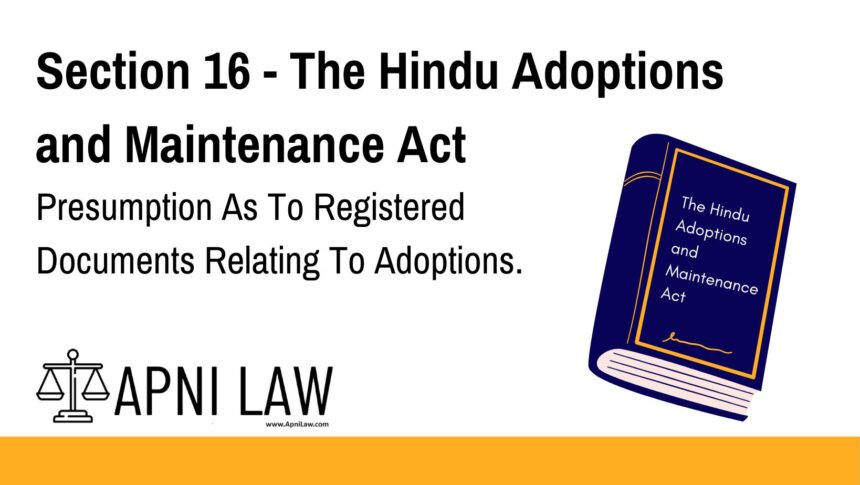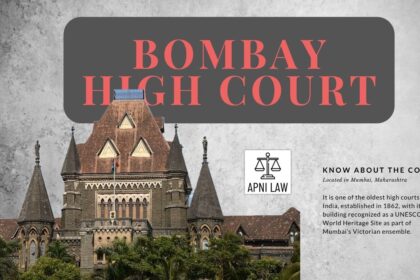Code: Section 16 of the Hindu Adoptions and Maintenance Act, 1956
“Whenever any document registered under any law for the time being in force is produced before any court purporting to record an adoption made and is signed by the person giving and the person taking the child in adoption, the court shall presume that the adoption has been made in compliance with the provisions of this Act unless and until it is disproved.”
State Amendment – Uttar Pradesh
In Uttar Pradesh, Section 16 has been amended as follows:
“Section 16 shall be re-numbered as sub-section (1) and the following shall be inserted as sub-section (2):
(2) In case any adoption is made on or after the first day of January, 1977, no Court in Uttar Pradesh shall accept any evidence in proof of the giving and taking of the child in adoption, except a document recording an adoption, made and signed by the person giving and the person taking the child in adoption, and registered under any law for the time being in force:
Provided that secondary evidence of such document shall be admissible in the circumstances and manner laid down in the Indian Evidence Act, 1872.”
[Vide Uttar Pradesh Act 57 of 1976, s. 35]
Explanation of Section 16
Section 16 of the Hindu Adoptions and Maintenance Act creates a legal presumption in favor of registered adoption documents. If a document that records an adoption is registered under applicable law and signed by both the giver and taker of the child, courts must presume that the adoption has been validly made under the Act.
This presumption can, however, be rebutted if there is evidence to the contrary. The provision is designed to reduce unnecessary litigation and give authenticity to properly documented adoptions.
Uttar Pradesh Amendment Highlights
In Uttar Pradesh, the rules are stricter. For adoptions made after January 1, 1977:
- No oral or alternative evidence is accepted unless the registered adoption document is produced.
- Only a properly signed and registered adoption deed will be considered valid primary evidence.
- Secondary evidence of such a document may be accepted under the Indian Evidence Act, 1872.
Illustrations
Example 1: Presumption of Valid Adoption
A registered adoption deed signed by both adoptive and biological parents is presented in court. The court presumes the adoption is valid under Section 16 unless someone provides strong evidence to prove otherwise.
Example 2: Uttar Pradesh Restriction
In a case in Uttar Pradesh, a man claims to have adopted a child in 1980 but provides only oral testimony. The court rejects the claim, stating that under the amended Section 16, only a registered document is acceptable proof of adoption.
Common Questions and Answers
1. What does Section 16 of the Act imply?
It creates a legal presumption that a registered adoption document is proof of a valid adoption unless disproved.
2. Is the presumption under Section 16 final?
No. It is a rebuttable presumption, which means the court will accept the adoption as valid unless there is evidence to the contrary.
3. What is the impact of the Uttar Pradesh amendment to Section 16?
For adoptions made in Uttar Pradesh on or after January 1, 1977, no court will accept proof of adoption unless a registered document is submitted.
4. Can oral evidence be used to prove adoption in Uttar Pradesh?
No. Oral or alternative evidence is not acceptable unless secondary evidence of the registered adoption deed meets the standards of the Indian Evidence Act, 1872.
5. What qualifies as a valid adoption document under Section 16?
A document that is:
- Registered under existing law,
- Signed by both the person giving and the person taking the child in adoption.
Conclusion
Section 16 of the Hindu Adoptions and Maintenance Act, 1956, provides significant evidentiary value to registered adoption documents. It helps establish adoption validity with fewer disputes and enhances legal clarity. The Uttar Pradesh amendment strengthens the requirement further by mandating the production of registered documentation for proving adoption in court. This provision is central to safeguarding the integrity and legality of the adoption process in India.
For legal guidance on adoption procedures, documentation, or family law matters, visit ApniLaw.








